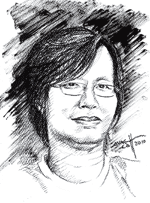Burma, which until very recently was seen as Southeast Asia's “problem child, is fast emerging as a rising star in the region. After decades of military misrule, many now feel that this battered country is ready to emerge as Asia's next tiger economy.
Among the biggest Burma boosters these days is Surin Pitsuwan, the secretary general of the Association of Southeast Asian Nations (Asean), who is currently visiting the country.
In a recent Bangkok Post commentary, he wrote that Burma “has not only opened herself to the world, she is now ready to compete constructively with the rest of the Asean member states and, by extension, with the rest of the world.”
Burma's ongoing “opening” to the outside world would, he added, “continue to present a set of formidable challenges to Asean.”
 |
Kyaw Zwa Moe is managing editor of the Irrawaddy magazine. He can be reached at [email protected].
|
Surin's comments were, in part, a response to remarks made by Burmese pro-democracy leader Aung San Suu Kyi, who told a visiting Asean Business Club delegation earlier this month that her “simple ambition” was “to see Burma ahead of all the Asean countries [in the next 10 years].”
But before Burma can match Suu Kyi's words with action, it will have a lot of catching up to do. And before that can even began, it will have to resolve a host of issues that have plagued it for decades.
In fact, Burma is just beginning to take its first steps out of the political and economic quagmire in which it has found itself for the past half-century. It must now deal with everything from ethnic conflicts to rampant cronyism and a fiendishly complicated foreign exchange system.
So far, Thein Sein’s nominally civilian government has had some success in convincing the Burmese people and the international community that he is at least on the right track. He has done this by reaching out to Suu Kyi, releasing prominent political prisoners, negotiating ceasefire agreements with ethnic armed groups and making tentative moves to open up the economy.
But even after a year of the most significant changes since 1962, there are many elements within the current government that have barely begun to budge. Most of the ex-generals in the former junta are still in charge, and no one from any of the opposition or pro-democracy groups holds a position in the government. The speakers of both houses of Parliament are powerful ex-generals.
Less than a year ago, these facts were seen as evidence that nothing at all had changed in the wake of the November 2010 election that was supposed to usher in a new era of “disciplined democracy.” Now, however, people seem willing to let this pass, perhaps believing that Suu Kyi will somehow be able to correct this situation after she wins a seat in Parliament in the April 1 by-elections.
That is wishful thinking. We know that there are “hardliners” lurking in the shadows, quietly staying out of the limelight but ready to pounce the moment they see any threat to their interests. Already, we have seen some efforts to trip up Suu Kyi's National League for Democracy (NLD), which is now on the campaign trail for the first time in more than two decades.
At a press conference on Monday, NLD spokesperson Nyan Win said that some authorities had obstructed the party's campaign activities by withdrawing permission to use sports stadiums and soccer fields for political rallies. However, within hours of making the complaint, the Union Election Commission informed the NLD that all such restrictions on its activities had been lifted.
This speedy response to the NLD's grievances came as a real surprise, but the reason for the problem was far less surprising. It turns out that the son of Sports Minister Tint Hsan is a candidate in the elections for the ruling Union Solidarity and Development Party (USDP), which also demonstrated in 2010 that it had no real faith in its ability to win on an even playing field.
According to reliable high-ranking officials, no more than 30 percent of those currently serving in the government are genuinely interested in reform. The rest, they said, are either sitting on the fence or actively resisting change.
Perhaps that is why Suu Kyi has taken pains to emphasize the military's importance in putting the country on the road to recovery.

